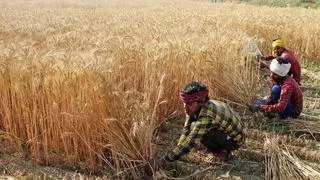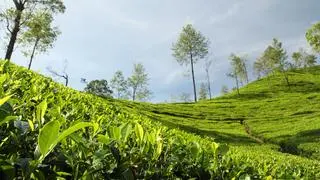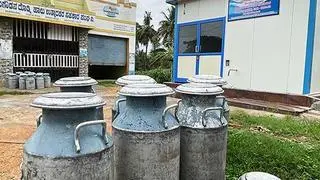Rahoul Sawani, President (South Asia) of the US-based Corteva Agriscience, recently demonstrated products with seed-applied technology (SAT), which offers better protection to seeds from pests. In an interview with BusinessLine at the company’s facility in Telangana, he speaks on the challenges for the agricultural sector in India, solutions to tackle them, and the company’s plans in the country. Edited excerpts..
What are the key challenges that Indian agriculture is facing?
In the last few years, India has made significant advances in the agriculture sector. However, given climate change, which gives pests and diseases increased opportunities to breed, feed, and proliferate, and factors such as income and gender inequality in agriculture, food insecurity has increased in India and globally. There is an urgent need to address food insecurity by taking on structural inequalities with effective policies. But in calling out climate change, environmental, and resource challenges, we also need to recognise the potential for agricultural innovation to improve food security by strengthening the food system resilience.
What are the solutions to address those challenges?
Innovative science-based solutions are becoming more important to help farmers maximise crop yields, while minimising resource inputs and helping them fbetter manage challenges of climate change — potentially reversing the downward trend in food security.
It is important to transform agriculture, while helping farmers combine profitability and sustainability. Focus on creating sustainable abundance via new applications of technology can disrupt the entire agriculture industry. Small-holder farmers are some of the most vulnerable populations in the world when it comes to climate change, and they are also some of the most food insecure. Building resilience and improving the food security of these farmers and their communities is critical to improving global food security.
Industry-wide collaborations to drive innovative projects and progressive solutions will strengthen farms and farmers so they can drive economic development. Additionally, higher investment to make the processing of seeds safer and more efficient, and expansion and modernisation of seed production can help transform the seed industry in India. With digital tools, superior seeds, and education and training initiatives, we can empower farmers with technologies that will help them adapt to changing weather patterns, intensifying pest pressure, and pathogens.
What are Corteva’s plans for expansion in India?
We have been partnering many external manufacturing companies across India, which has a key role to play in a robust global supply chain. India is a growth market for us, and we are delivering strong growth here.
Given the significant advances in the agriculture sector, the knowledge, and the right skill sets and capabilities, we see all the reasons to expand even further, both from a market standpoint in improving the life of farmers, as well as consumers.
How big is Corteva in India?
We have been in India for about 50 years through our legacy company. In the seed segment, we operate in key crops – corn, rice, millets, and mustard, where we have a leadership position. On the crop protection side, we have solutions that focus on rice, corn, fruits, and vegetables, and span the whole gamut of herbicide, fungicide, insecticide and seed treatment categories. India is one of the key growth markets, and we are committed to the long term.
With more than 1,400 employees, three business offices, two in Hyderabad and one in Gurgaon, three production and manufacturing facilities and three R&D facilities, and geographical outreach in 24 states, we deliver services to 10 million farmers and 150 million hectares of farmland in India. As part of our community partnership initiatives, we also work with tribal women, smallholder farmers and rural youth across geographies and are creating & supporting FPOs, offering mechanisation solutions and supporting agri entrepreneurs.
The debate over the excessive use of chemical pesticides continues to rage and demands have been made to reduce their footprint. What is your view?
Chemical fertilisers are often used in excessive and disproportionate amounts to increase crop yields, especially in adverse weather conditions. However, crop protection chemicals are an active ingredient in the agriculture sector, which prevent crop losses. Sustainability intensified crop protection solutions within the confines of a regulatory framework is the need of the hour, to make food production environmentally friendly, and above all, effective while optimising output.
Today, the Indian agrochemical industry holds a prominent position on the global stage. India is the fourth-largest producer of agrochemicals in the world, and the industry has a huge unrealised potential to grow further. India has fundamental advantages, with the right technology, investment, and policies, and I believe there are tremendous opportunities to unlock for the industry.
Developed with sustainability in mind, our pipeline of crop protection innovations is designed to address resistance, reduce residuals and work in synergy with our seed products. Corteva molecules and formulations feature properties such as low effective use rates, favourable environmental impact, and minimal toxicological profile.
Can you throw some light on your seed operations and the size of the seed portfolio?
Corteva in India is involved in four key crops -- corn, rice, millet, and mustard. We breed hybrids for these crops and have breeding stations in different climatic zones, with an advance research centre based out of Hyderabad. After breeding a hybrid, it is tested in varying growing conditions on farmers’ fields, before being commercialised.
Except for corn and millet, hybridisation is increasing in all other crops. In corn and millet crop already, substantial acres are under hybrid cultivation. With the adoption of new hybrids, corn production has grown to 33.18 million tonnes in 2021-2022, from 22.2 million tonnes in 2012-13. Millet hybridisation has been instrumental in more than doubling production in India, despite a year-on-year reduction in acreage. The all-India average yield has improved from 688 kg/ha to 1,391 kg/ha despite acreage dropping by 25 per cent.
We offer Seed Applied Technologies (SAT) to provide the solution directly to the seed when it is required. The product will be used for paddy and maize crops in Indonesia, and has already been introduced in Thailand and China in the Asia-Pacific region. In India we have started field trials with rice farmers, and have applied for registration.









Comments
Comments have to be in English, and in full sentences. They cannot be abusive or personal. Please abide by our community guidelines for posting your comments.
We have migrated to a new commenting platform. If you are already a registered user of TheHindu Businessline and logged in, you may continue to engage with our articles. If you do not have an account please register and login to post comments. Users can access their older comments by logging into their accounts on Vuukle.